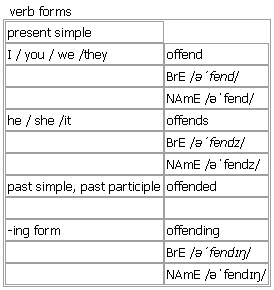|
Từ điển Oxford Advanced Learner 8th
 offend
offend

of·fend [offend offends offended offending] BrE [əˈfend] NAmE [əˈfend] verb
1. transitive, often passive, intransitive ~ (sb) to make sb feel upset because of sth you say or do that is rude or embarrassing
• They'll be offended if you don't go to their wedding.
• Neil did not mean to offend anybody with his joke.
•She managed to offend her boyfriend's parents as soon as she opened her mouth.
•A TV interviewer must be careful not to offend.
2. transitive ~ sb/sth to seem unpleasant to sb
•The smell from the farm offended some people.
•an ugly building that offends the eye
3. intransitive (formal)to commit a crime or crimes
•He started offending at the age of 16.
•What is the best way to stop someone who has offended from repeating the offence?
4. intransitive ~ (against sb/sth) (formal)to be against what people believe is morally right
•comments that offend against people's religious beliefs
Derived Word: ↑offended
Verb forms: 
Word Origin:
late Middle English: from Old French offendre, from Latin offendere ‘strike against’.
Thesaurus:
offend verb T, often passive, I
•Many people were deeply offended by his jokes.
insult • • shock •
feel offended/insulted/shocked
deeply offended/insulted/shocked
Offend or insult? To insult sb is to do or say sth rude to them, usually deliberately. To offend sb is to upset them, either because you have insulted them, or because you have been rude or thoughtless about sb/sth that is important to them.
Example Bank:
•He was very sensitive and easily offended.
•Omit anything that is likely to offend people.
•She sounded offended when she replied.
•She stopped mid-sentence, anxious not to offend him.
•Viewers complained that the broadcast offended against good taste.
•Neil did not mean to offend anybody with his joke.
•Some people found his jokes funny but others were deeply offended.
•They'll be offended if you don't go to their wedding.
|
|
|
▼ Từ liên quan / Related words
Related search result for "offend"
|
|
